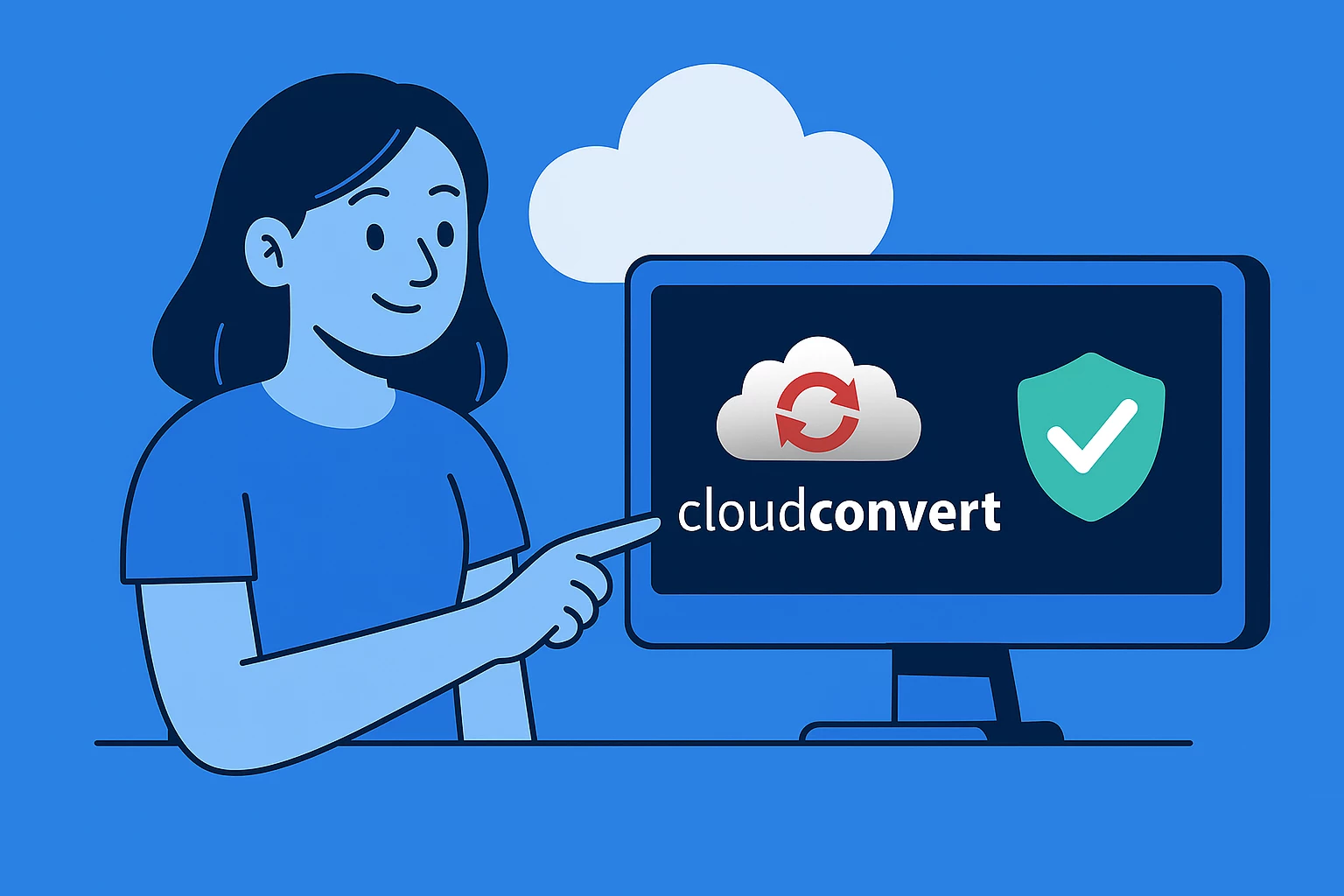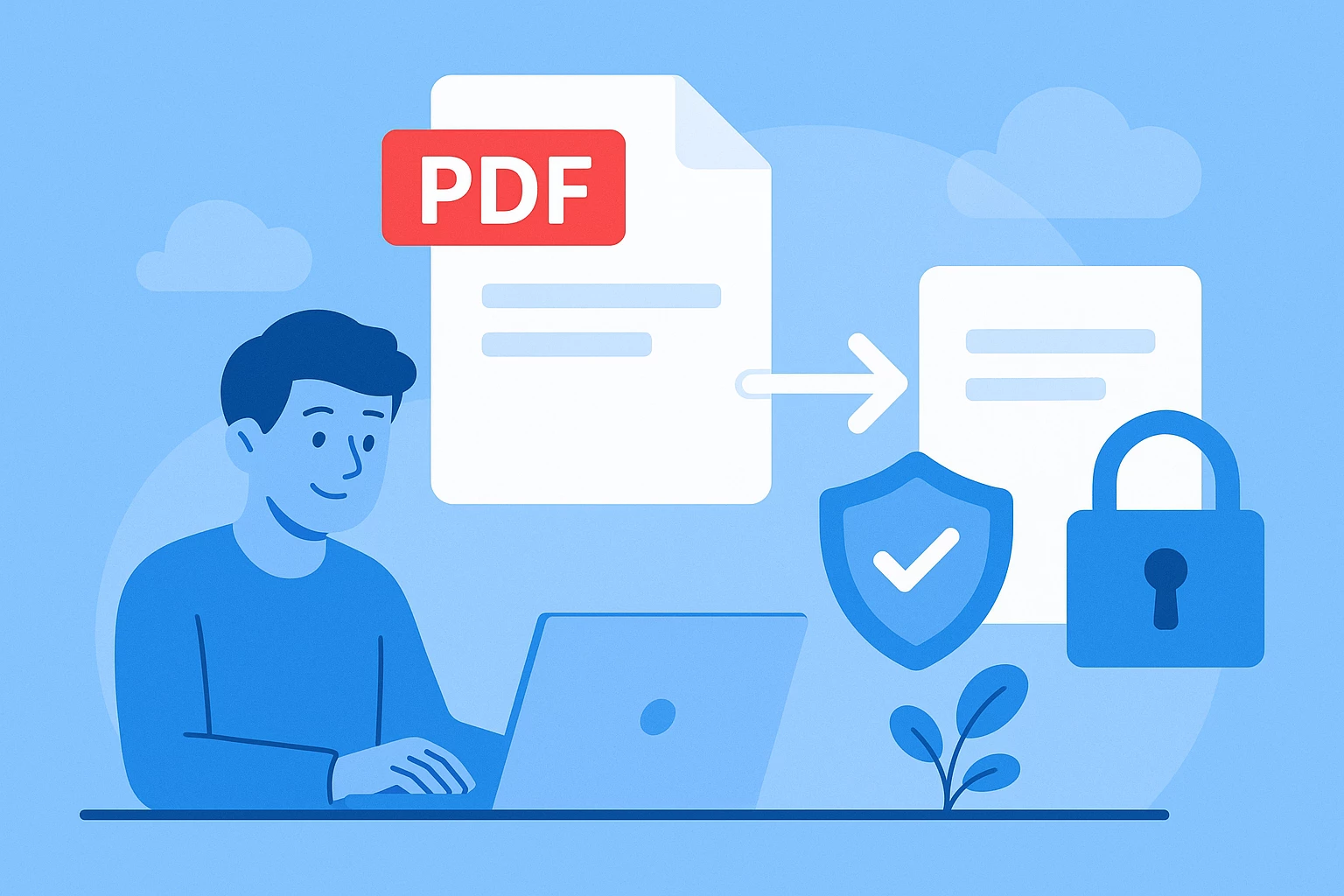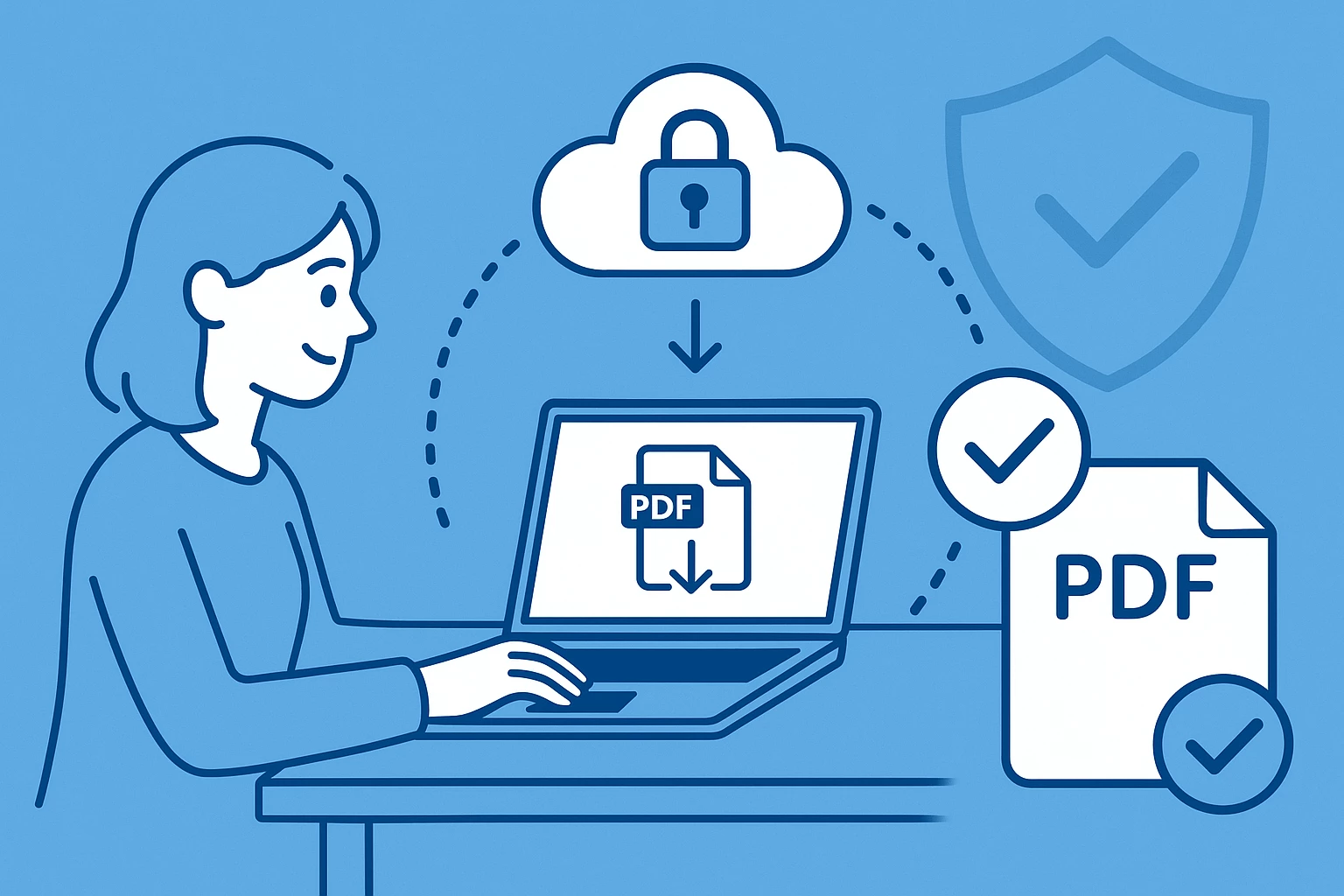
Is Cloudconvert Safe? Safety Review (+ A Trusted Alternative)
I’ve come across CloudConvert many times as a convenient way to handle file conversions online. It’s known for supporting a wide range of formats and saving you the trouble of downloading software. Students often use it for essays and presentations, businesses for documents and media files, and casual users for quick, one-off tasks.
However, convenience doesn’t automatically mean safety. Uploading files to any online service raises questions about privacy, security, and reliability. Due to this, I decided to take a closer look at CloudConvert: how it works, why people use it, and its overall safety. Toward the end, I’ll also share a trusted alternative for those looking for a more secure solution.
If you're looking for a practical, experience-based perspective on CloudConvert that covers its strengths, limitations, and overall safety, read on for a detailed review before choosing the right file converter for your needs.

What is CloudConvert?#
CloudConvert is an online file conversion platform that enables you to convert documents, images, videos, audio files, and more directly from your browser without installing any software.
When I first tried CloudConvert, what stood out was how straightforward it felt. The platform launched in 2012 with a simple idea: allowing people to convert files online without complicated setups or technical skills. Over the years, it added more features and format support, becoming a practical tool for different types of users.

CloudConvert supports a long list of file types. I’ve used it for PDFs and Word files, but it also handles images, spreadsheets, presentations, audio, video, and even e-books. This makes it useful in a variety of situations, no matter if you’re updating a project report or resizing an image for personal use.
Its popularity also comes from accessibility. Students prefer the free plan for smaller tasks, businesses integrate it into workflows using the API, and casual users appreciate the speed and browser-based setup. It’s not perfect, but it does cover most basic file conversion needs without much hassle.
Is CloudConvert Safe to Use?#
The short answer is yes, CloudConvert is generally safe for everyday file conversions. I’ve looked at its privacy policy, data handling practices, and security measures, and for most users, it offers a secure environment. I mean, there are still a few things worth knowing before you upload sensitive documents.
From a privacy perspective, CloudConvert keeps the process straightforward. The platform automatically deletes files after processing, usually within 24 hours, and the conversions run through automated systems rather than human reviewers.

Additionally, your data isn’t stored long-term or used for advertising, which is reassuring. They do keep some basic log information, e.g., IP addresses and timestamps for a limited time, mainly for troubleshooting and performance monitoring, but nothing that feels invasive in normal use cases.
On the security side, all file transfers run over HTTPS, so your uploads and downloads are encrypted while in transit. The service also relies on secure, isolated containers for each conversion task, which means your files aren’t mixed with other users’ data on the backend.
Overall, I haven’t come across any major breaches or security incidents linked to the service, and it aligns with common data protection standards, such as GDPR.
You may also be interested in our Is Convertio Safe? Honest Review (+ A Top-Rated Alternative for 2025) guide
Potential Risks to Consider#
Even so, I tend to be careful with highly sensitive files on any online platform, CloudConvert included. The service has strong security measures in place, but like with any tool that processes files over the internet, there is always some level of risk to consider.
Moreover, I also noticed that while files are deleted quickly, log data stays on their servers for a while, which could be a concern if you’re working with extremely sensitive information. For most day-to-day needs, it typically doesn’t create issues, yet it’s good to keep in mind.
CloudConvert User Trust and Reputation#
When I wanted to get a real sense of how people feel about CloudConvert, I started with user reviews on platforms such as TrustPilot, Reddit, and Quora.
The general impression was positive - many users highlight how easy it is to get started and how reliably it handles a wide range of file types. Some talk about using it for quick personal tasks, while small businesses appreciate that it requires no installation or complicated setup.
However, I noticed a pattern in the more critical reviews. Some users feel the free plan falls short for heavy workloads, especially with large files or frequent conversions. Others wish for more advanced features, but CloudConvert has always focused on being a straightforward conversion tool rather than a complete document management platform.

On the business side, CloudConvert seems to have earned a decent level of trust. Its API is widely used by startups and small companies to automate file conversions in their workflows.
Also, schools and smaller organizations rely on it because it doesn’t require complex IT setups.
I didn’t find big endorsements from professional associations or large enterprises, but the steady use across developers, educators, and small businesses shows that it has built a reliable reputation over the years.
Overall, the feedback seems consistent. Most people rely on CloudConvert for routine file conversions while acknowledging that it has limits when it comes to heavier or more specialized work.
When CloudConvert May Not Be Safe Enough#
In most everyday scenarios, CloudConvert works just fine. But there are cases where I’d be cautious. For instance, if I were dealing with highly confidential legal contracts or medical records, I wouldn’t want those files processed on any third-party server, even one with solid security measures in place.
The same applies to sensitive financial reports or internal business data. Some organizations have strict policies about data residency, access control, and retention. Even though CloudConvert deletes files automatically, it doesn’t give you the kind of end-to-end oversight that certain industries demand.

Finally, large companies often face compliance standards like GDPR or HIPAA that require full audit trails and, in some cases, private cloud or on-premises processing. CloudConvert isn’t really designed for that level of regulatory control, which is why I wouldn’t use it in environments where compliance is non-negotiable.
You might also be curious about our Is FreeConvert Safe? Answered (2025 Edition) guide
How to Use CloudConvert Safely#
When I use CloudConvert, I keep a few simple habits in mind to reduce any unnecessary risk. The first is obvious but worth repeating: I avoid uploading anything confidential.
Personal documents with sensitive data, financial records, or anything covered by strict compliance rules just don’t belong on a third-party service, no matter how secure it claims to be.
I also make sure to delete files as soon as I’m done. CloudConvert removes them automatically after a set period, but I prefer not to leave anything on their servers longer than necessary.
While most people overlook this step, using a secure and trusted network matters more than you might think. Public Wi-Fi in a café isn’t the best place for file transfers, even with encryption in place.
For such files I convert regularly, things such as presentations, images, or standard office documents, I’ve never had concerns. These are routine, low-risk files where convenience usually outweighs any small level of risk.
Some users like to use CloudConvert’s browser extensions or direct integrations with storage services to speed things up and minimize extra uploads.
I’ve tried a few of these, and they help reduce steps, though I still apply the same basic precautions whenever I’m working with files online.
A Trusted Alternative to CloudConvert#
After outlining where CloudConvert works well and where it may fall short, it is worth introducing MConverter, a platform built with user control and data protection at its core.

One of MConverter’s key features is process isolation. Every file is converted in a separate environment, ensuring no file can interfere with another. Our software’s setup eliminates the risk of one user’s file affecting someone else’s and keeps each conversion fully independent.
MConverter also follows the Your Files. Your Control principle. Only you can view the files you upload. After conversion, they are automatically deleted from the servers within four hours, and you can delete them immediately yourself with a single click if you prefer.
For situations where a conversion fails, MConverter applies a responsible handling policy. You can give the support team temporary access to troubleshoot the issue, but even then, strict internal rules govern how the files are managed. As soon as the problem is resolved, the files are permanently removed.
Security during transfer is handled through SSL encryption, which keeps files protected while moving between your device and MConverter’s servers.
Additionally, our platform operates with no third parties involved in file processing. Your data is never sold, shared, or used for advertising. Everything happens entirely in-house from start to finish.

Finally, MConverter has a proven track record. With more than 15,902,310 files converted as of August 1, 2025, we have earned the trust of thousands of users who need both convenience and enhanced data security. For anyone looking for a reliable, privacy-focused alternative to CloudConvert, MConverter provides a strong option!
You can also explore our Is Zamzar Safe? Safety Review (+ Pros, Cons & Alternatives) guide
Is CloudConvert Free to Use?#
Yes, CloudConvert offers a free plan, but it comes with limits. You can convert a certain number of files each day without paying, which is usually enough for light, occasional use.
For larger files, higher conversion speeds, or frequent processing, you need one of their paid plans or pay-as-you-go credits. I’ve found the free version fine for basic tasks, but businesses or anyone handling big workloads typically outgrow it quickly.
Does CloudConvert Keep My Files?#
CloudConvert automatically deletes your files after a short period, usually within 24 hours of processing. If you prefer not to wait, you can delete them manually right after the conversion finishes.
As I said, the platform doesn’t store files long-term or use them for advertising or marketing purposes, which makes it suitable for everyday, non-sensitive tasks. For highly confidential data, though, I still prefer tools that give even tighter control over storage and deletion.
Can CloudConvert install Malware on My Computer?#
No, CloudConvert itself does not install malware on your computer. It runs entirely in your browser and doesn’t require you to download or install any software.
The files you convert stay on their servers until processing is complete and are then deleted automatically. Of course, like with any online tool, you should always access it through the official website rather than third-party links to avoid any potential security risks.
Is CloudConvert Safe for Business Use?#
For general business tasks like converting presentations, standard office documents, or marketing materials, CloudConvert is typically safe to use. It offers encrypted transfers, automatic file deletion, and no third-party data sharing, which covers most everyday needs.
However, if your work involves highly confidential information or strict compliance requirements such as HIPAA or certain GDPR provisions, you may want a platform that provides more control over data storage, access, and audit trails. In those cases, CloudConvert might not meet every organizational standard, so assessing your specific security and compliance needs first is a good idea.
What File Formats Does Cloudconvert Support?#
CloudConvert supports a wide range of file formats across documents, images, audio, video, and even e-books.
You can convert PDFs, Word documents, Excel spreadsheets, PowerPoint presentations, images like JPEG and PNG, audio files such as MP3 or WAV, video formats like MP4 or MOV, and e-book files including EPUB and MOBI. In my experience, if you need to switch between common file types, CloudConvert almost always has you covered.
You can also read our Top 10 Cloudinary Alternatives for 2025 (Free & Paid) guide
What Is the Safest Alternative to CloudConvert?#
MConverter is one of the safest alternatives to CloudConvert. It processes each file in a separate, isolated environment, automatically deletes them within four hours, and never shares data with third parties.
All transfers are protected with SSL encryption, and every conversion happens entirely in-house. This setup gives users more control over security and privacy while keeping the process simple and fast.
Final Verdict: Is CloudConvert Safe?#
Overall, CloudConvert is safe for most everyday file conversions. It uses encrypted transfers, deletes files automatically after processing, and doesn’t share data with third parties. For personal use, students, small businesses, and anyone converting standard documents or media files, it offers a secure and convenient option.
However, it may not be the best choice for highly confidential legal, medical, or financial files, or for organizations with strict compliance requirements. In those cases, a platform like MConverter, with stronger isolation measures and more direct control over file handling, provides extra peace of mind.
About the author
Mihael joined MConverter as a co-founder in 2023, bringing a vision to transform a tech tool into a product company built around meaningful user experience. With roots in B2B sales, product development, and marketing, he thrives on connecting the dots between business strategy and customer needs. At MConverter, he shapes the bigger picture - building the brand, inspiring teams, and pushing innovation forward with a can-do mindset. For Mihael, it’s not just about file conversions, but about creating experiences that deliver real impact.
Check out more articles

Is Anyconv Safe: Anyconv Review – Is It Safe or Risky?

Is iLovePDF Safe? In-Depth Review – Is It Safe or Should You Avoid It?












